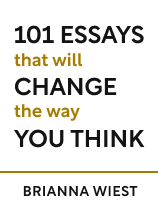

This article is an excerpt from the Shortform book guide to "101 Essays That Will Change the Way You Think" by Brianna Wiest. Shortform has the world's best summaries and analyses of books you should be reading.
Like this article? Sign up for a free trial here .
Do you think the world is largely a positive place? How does the way you think about and interpret the world influence the way you experience it?
No life experience has inherent qualities of its own—such as being good, bad, right, or wrong. You only assign these values to them because of the way you think about and interpret them. Over time, your habitual ways of thinking are reinforced through feedback loops.
Keep reading to learn about the psychology of feedback loops and how they shape your reality.
Feedback Loops Reinforce Your Thoughts and Feelings
It’s not your experiences that determine how you feel, but your thoughts about these experiences. Further, it’s difficult to change the way you think and feel about what happens to you. This is because your thinking patterns lock you into a feedback loop that reinforces the way you interpret your experiences. In psychology, feedback loops occur when your emotions cause you have certain thoughts, those thoughts cause you have certain emotions, perpetuating the cycle further and further.
The following five-step process illustrates how feedback loops reinforce your thoughts and feelings:
- Your state of mind influences what types of thoughts you have. For example, you’re experiencing stress so you have worrisome thoughts.
- Those thoughts influence the way you feel. Your worrisome thoughts make you feel anxious and this increases your stress levels.
- Your feelings determine what you pay attention to. Your feelings of anxiety compel you to focus disproportionately on things that are going wrong in your life. As a result, you engage in more worrisome thoughts and further increase your stress levels.
- What you pay attention to determines how you interpret and judge your experiences. Your focus on what’s going wrong in your life leads you to judge your experiences as difficult or problematic—because it blocks you from perceiving what’s going well in your life.
- Your judgments reinforce how you feel, what you think, and your state of mind. Because you’re judging your experiences as problematic, you continue to feel anxious and you believe that you have a reason to experience stress. As a result, you continue to interpret everything that happens from this negative perspective.
How Unconscious Biases Reinforce Feedback Loops
Psychological research expands upon Wiest’s description of the interpretation process by explaining that your habitual thoughts and feelings are influenced and reinforced by cognitive biases. Cognitive biases are the result of your brain’s attempt to make quick judgments based on your past experiences, and they shape the way you think about and perceive your environment.
There are many different types of cognitive biases, and each of them influences your perception in different ways. The most common forms are confirmation bias, the tendency to pay more attention to the information that confirms and reinforces your opinion, and negativity bias, the tendency to notice and dwell on the negative aspects of your experience.
The example in the five-step process above demonstrates how both of these biases reinforce how you feel, what you think, and your state of mind: The confirmation bias influences you to only notice and interpret experiences that reinforce your feelings of anxiety. Likewise, the negativity bias keeps you focused on what you dislike or fear about your experiences. As a result, you find it difficult to disentangle yourself from your stressful state of mind, think differently, and ease your feelings of anxiety.

———End of Preview———
Like what you just read? Read the rest of the world's best book summary and analysis of Brianna Wiest's "101 Essays That Will Change the Way You Think" at Shortform .
Here's what you'll find in our full 101 Essays That Will Change the Way You Think summary :
- Why the only way to make yourself feel better is to change the way you think
- How social conditioning influences the way you unconsciously think
- How to manage your thoughts and feelings about yourself and your experiences






